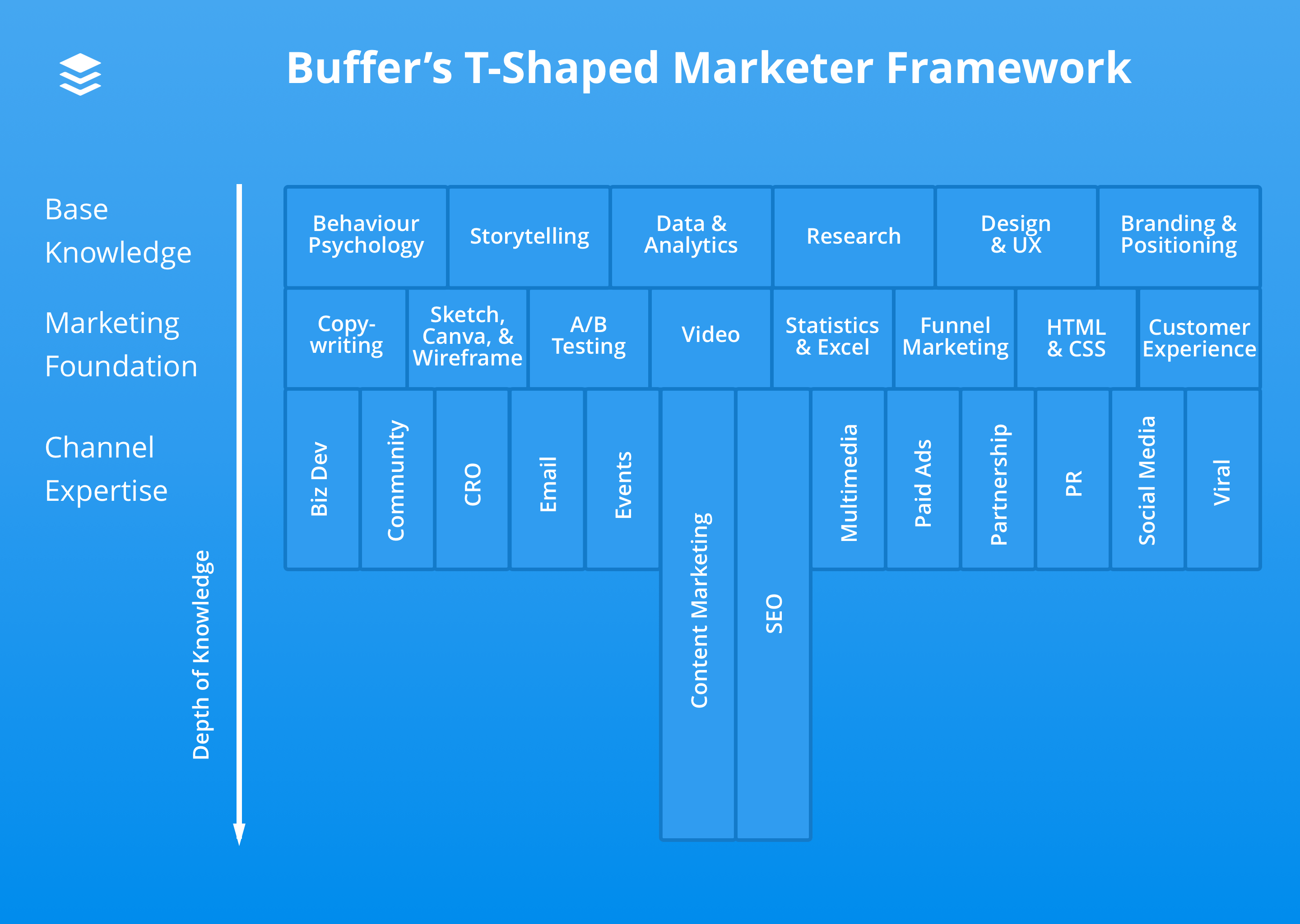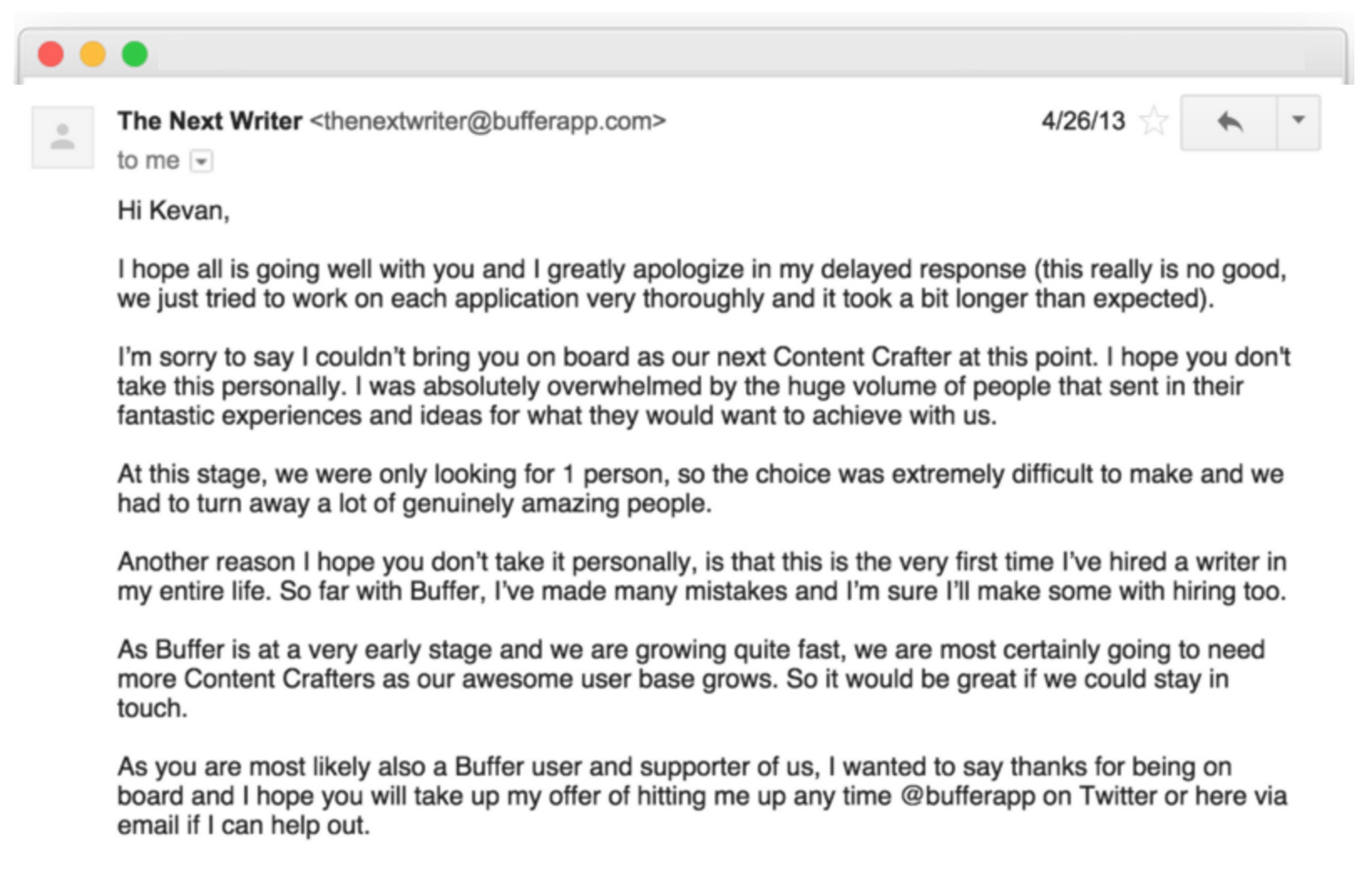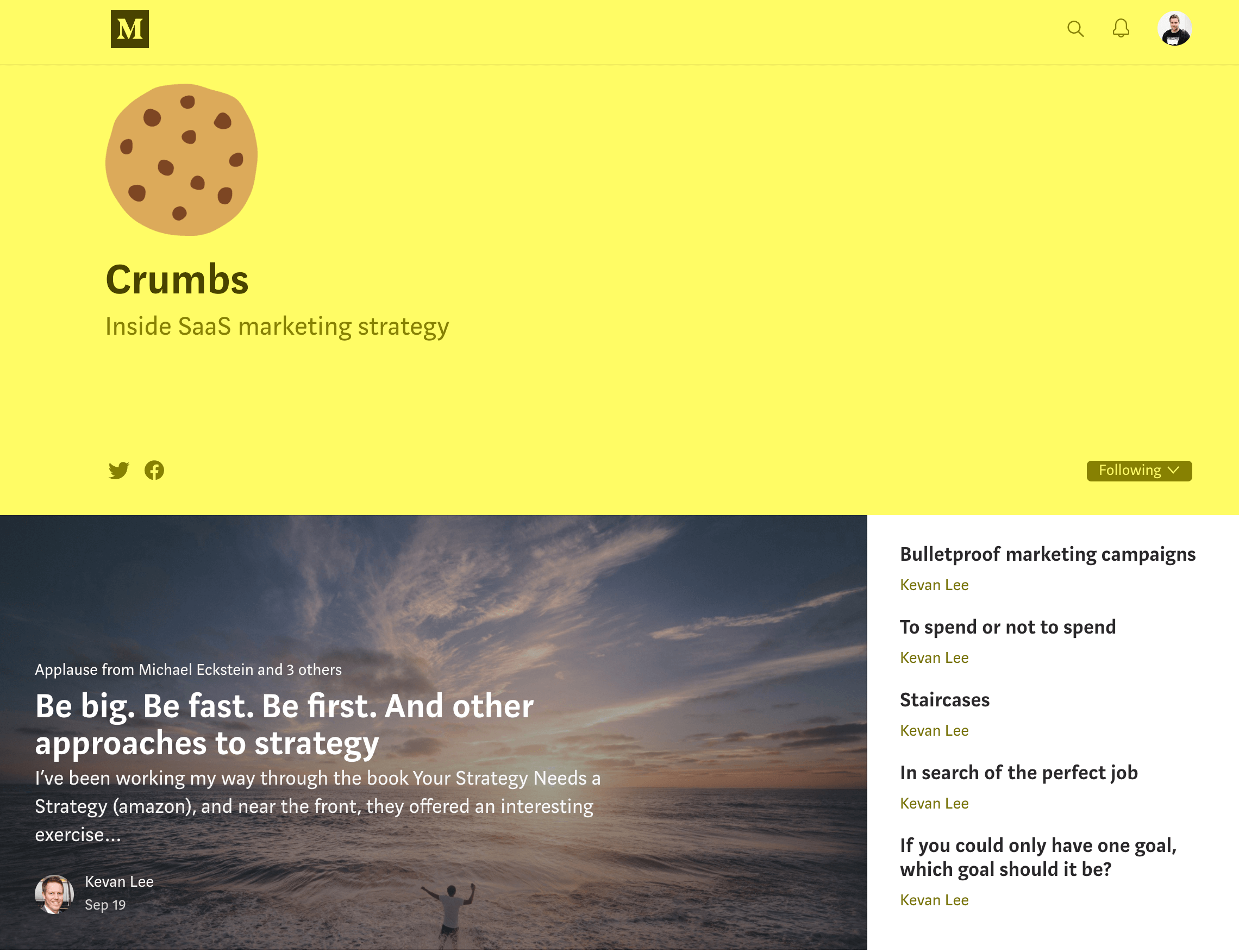
7 Tips for Building a Career in Marketing (Advice and Insights From Top Founders and Investors)
Head of Content at Buffer
“How did you get into marketing?”
At Buffer, members of our marketing team are often asked this question. And the truth is, the path looks different for each of us:
- Alfred was in the army
- Arielle was a health coach
- Kevan, our Marketing Director, was a sports reporter
But for those of you out there who want to start a career in marketing or maybe build from where you are in 2018, we’d love to help you figure out:
- How can you transition from your current role into marketing?
- What should you focus on learning?
- What skills do you need?
To help answer these questions (and more!), we’ve teamed up with Product Hunt, who recently published their first book on careers. The book highlights the best insights from top founders and investors on mentorship, overcoming challenges, and the best and worst career advice they’ve received.
In this post, we’ll share some of the insights from Product Hunt’s book — including lessons from Tim Ferriss and Reddit co-founder, Alexis Ohanian— as well as some advice on building a career in marketing from the Buffer marketing team.
Ready to jump in?

7 Tips for building a career in marketing
1. Form habits around your strengths
You are the average of the five people you associate with most. Also, you don’t need to get much right to be and feel successful. Just form habits around one or two strengths.
Tim Ferriss
In Product Hunt’s book, Tim Ferriss’ #1 piece of advice for anyone looking to kickstart their career is to “Form habits around a few strengths.”
And at Buffer, we’ve built our marketing team around our individual, core strengths. For example, as an Editor, I focus mainly on my strengths in content marketing and SEO:

As Kevan explains in our t-shaped marketer post:
Generally-speaking, everyone on the Buffer marketing team will have all the base knowledge and marketing foundation skills; plus, each teammate will have chosen at least one main channel in which they are an expert.
Try to form habits around whatever discipline of marketing you’re most excited about:
- If you’re into video, download some stock footage and start editing it
- If you want to become an SEO master, try reading as much content as possible from places like Moz, Ahrefs and Backlinko
- If writing is your thing, set aside time in your calendar each day to sit and write
It can be daunting to look at marketing and think you need to fully master: analytics, data, CRO, SEM, advertising, copywriting, SEO, community and more.
But in reality, to be a successful marketer, you don’t need to be an expert in every channel: one or two areas of expertise will be enough.
However, before diving right in and choosing an area or two to focus on, experiment with a bunch of different skills to see what’s the best fit for you.
2. “No” is just a starting point
The best piece of advice I ever received was that “No” is often just the starting point, and most careers worth having involve a fair amount of determination, grit, and just general “try, try again”-ing.
Kathryn Minshewf, Founder of The Muse
When it comes to kickstarting a career in marketing—or even climbing the ladder, you’ll likely hear “No” and a lot more than “Yes”.
From pitching editors content ideas to applying for various roles and freelance gigs, throughout my career, I’ve been told “No” plenty of times.
But what I learned along the way was that each “No” was bringing me a step closer to a “Yes”. For example, each article pitch I had rejected helped me to eventually land my first paid writing gig with Crew.
And When I landed my role at Buffer, it was actually the second time I applied — Kevan, who’s now our Marketing Director, was also unsuccessful in his first Buffer application:

Kevan used the above note as motivation and failing to land his dream job helped him to realize where he could focus his energy to improve.
Treat each “No” as an opportunity to learn and refine your skills.
3. Focus on timeless skills
Write every day. Even if you’re not a writer, I find this practice to be clarifying for many things.
MG Siegler, Partner at Google Ventures
There are certain skills that will never become outdated in marketing. To name a few:
- Communication
- Writing
- Storytelling
These skills will always be valuable.
For example, whether it’s a blog post, copy for a landing page or captions for a video, writing will always be a key skill for marketers to have.
And before joining Buffer, Kevan used to write 2,000 words minimum every day to help improve his craft. Alfred also challenged himself to write every day before he worked at Buffer and again when he first transitioned into a content-focused role.
Try to find opportunities in everyday life where you can practice these timeless skills.
For instance:
- Treat every tweet or email you send as a chance to improve your writing skills
- Next time you’re speaking with a customer service agent, think about how you can make your communication really clear and easy to understand
- The next time you compose a Facebook status, think about how you can effectively tell the story you’re looking to share (these storytelling formulas may help)
4. Pursue side hustles
If you’ve got things you want to build, just build them for the sake of learning a new thing.
Alexis Ohanian, Co-founder of Reddit
At Buffer, we love side projects.
And when it comes to marketing, side projects can be a great way to learn new skills and embrace areas you’re passionate about.
For example, when our content crafter, Alfred, was keen to learn more about design and coding websites, he set out on a mission to redesign his personal site and code the changes himself.
Playing around with my personal blog design in Sketch again. Sharing a *very* early homepage design here. Thoughts are welcome! ? pic.twitter.com/oBJfDd05gn
— Alfred Lua (@alfred_lua) July 25, 2017
This side project enabled Alfred to level up his skills and now he can even commit changes to Buffer code:

Without taking on this side project, Alfred may not have had the opportunity to learn about design and development. But through a side project he’s picked up some skills that are invaluable to our team.
No matter what stage of your career you’re at, side projects are a great way to learn and level up your skills.
When it comes to thinking about a side project, I love the three rules Hiut Denim Co shared on Medium:
- They don’t have to provide you with a living. You can still eat if they fail.
- They don’t have a deadline. And as there is no time pressure, you don’t revert to your usual formula. You try new things. You experiment. You take risks.
- This is a Labour of Love. You provide the ‘Labour’. And you provide the ‘Love’. So when you spend time on it, it is because you really want to. That keeps you coming back and pushing it on. That’s important. This thing will require you to keep plugging away at it, maybe, for years.
And across the Buffer marketing team we still embrace side projects that help us to level up our skills in marketing and other areas:
- Kevan has a weekly newsletter on marketing and leadership
- Hailley has a future of work podcast
- Alfred has a blog focused on distribution strategies
- I have a site to help people discover new homeware brands
5. Embrace the industry
I truly believe that to excel in a specific industry if you are a creative, you need to live and breathe the industry.
Helena Price, Photographer
Marketing is an ever-changing industry.
The platforms we use to reach our target audiences, like Facebook, Instagram and Google are constantly evolving and the tactics that deliver results one day, don’t the next.
Often, the most successful marketers succeed because they love what they do and always keep on top of the latest trends, news, and developments.
Marketers at all stages of their careers can benefit from following industry blogs, publishers and leaders.
Here’s a quick list of sources I’d recommend following:
Marketing industry blogs
- AdWeek: a leading source for news and insight for marketers
- AdAge: daily news and updates from the marketing and media landscape
- CMO: insights, expertise and inspiration for and by digital leaders
Individuals to follow
- Matt Navarra: for all things social media
- Rand Fishkin: for SEO, marketing and leadership
- Ali Mese: for a ton of great startup marketing and content advice
6. Help others
Figure out what you’re good at and start helping other people with it—give it away. Pay it forward.
Naval Ravikant, Co-founder of AngelList
One of the best ways to progress in your career is to help others.
When you take the time to help others solve problems and offer feedback, you get the chance to showcase your skills and build your network at the same time.
When it comes to finding people to help out, you could start with answering relevant questions on communities like Inbound, GrowthHackers and Quora.
For example, early in his career, Hubspot’s Director of Acquisition, Matthew Barby, searched the internet for marketing questions he could answer in order to help others:
I scoured through online forums and communities to find questions that I could answer, and when I did answer them, I’d go into great detail.
Keep your eyes peeled across social media for opportunities to help people in your niche, too. Often individuals will turn to Twitter and other online communities when they’re looking for some feedback or help.

Creating content is also a good way to help other marketers. For example, Kevan shares frequent insights about marketing at Buffer in his Medium publication, Crumbs:

And SEO consultant, Dan Shure, takes people behind the scenes of life in the SEO world with his vlog:
Always be on the lookout for opportunities to help others.
7. Think like a journalist
The most important thing about being a good journalist is the ability to think critically. A good journalist asks the right questions, finds the truth in a story, and tells the reader what matters.
David Ewalt, Author of Of Dice and Men
With the above quote in mind, marketers and journalists are much alike.
In marketing, it’s important to always have a critical eye and question everything. For example, if traffic on your blog has increased, you might ask yourself:
- What’s caused the increase?
- Where is the traffic coming from?
- Why has this happened? And can we repeat this success?
It’s also important for marketers to find the truth in what we’re sharing. Often, marketing content will reference data or studies and it’s up to us as marketers to fact-check what we’re sharing and ensure we attribute the correct sources.
Smooch Editorial Director, Dan Levy, explains on Moz:
"I once had a blog post queued up and ready to go live first thing the next morning until our eagle-eyed social strategist recognized one of the case studies cited in the post and noticed that the author had completely misinterpreted the results. In a small industry, examples and stats often get recycled from one blog to the next. The result is a case of broken telephone where the facts get muddled in transit. Proper attribution makes it easier to track where the breakdown occurred and to set the record straight."
In marketing, it’s a good practice to approach everything with a curious eye and look for the “why” and “how” behind every piece of data.
As Brian Balfour shares on his blog:
Real insights do not happen by scratching the surface. Real insights come from digging to the deeper layers.
Over to you
Thanks so much for checking out this post. If you’re interested in some more career advice from uber-successful founders and investors, you can check out Product Hunt’s book here.
I’d love to continue the conversation with you below, too.
What would your advice be for someone looking to build a career in marketing? Or if you’re trying to break into the marketing industry, feel free to ask any questions below in the comments.
Try Buffer for free
140,000+ small businesses like yours use Buffer to build their brand on social media every month
Get started nowRelated Articles

I spoke to leading B2B content marketers (an in-house content director, agency owners, top freelancers, and thought leaders) to find out what they think B2B brands can do to create good content in 2024.

Black Friday and Cyber Monday marketing guidance to help you stand out from the crowd — complete with tried-and-tested examples.

Over the past two years, Buffer’s Senior Growth Marketing Manager, Sophie, has run 25 A/B tests in Google Adwords. In this article, she shares her strategic approach to conducting successful marketing experiments, how to come up with new experiment ideas, and the lessons she’s learned along the way.